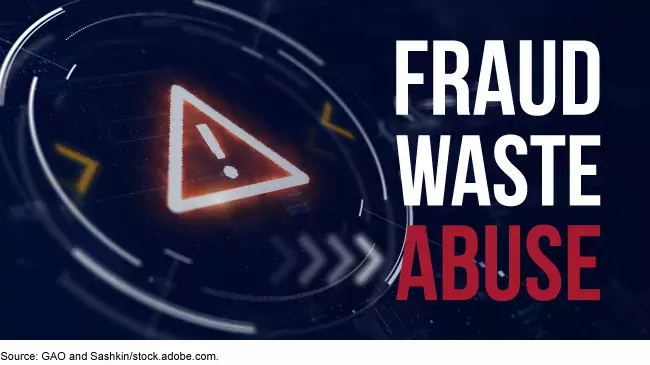You’ve Heard of Fraud, Waste, and Abuse of Tax Dollars; Let’s Look at Preventing Abuse
Abuse, while often present alongside fraud and waste, can cause substantial losses to the federal government on its own. For example, the Veterans Affairs Office of Inspector General reported that potential abuse of overtime pay within one VA division cost the federal government as much as $23.8 million during fiscal years 2017 and 2018.
This is just one example of how federal resources can be abused and cost taxpayers millions. Today’s WatchBlog post looks at our new GAOverview about understanding abuse of federal resources.
Image

What is Abuse?
Abuse occurs when someone behaves improperly, unreasonably, or misuses a position or authority for personal gain. It is behavior that a prudent person would not consider reasonable. Sometimes federal employees abuse program resources. For example, employees with access to government charge cards (credit cards) could abuse them by:
- Using a travel credit card to purchase personal items
- Making cash withdrawals of unusually high amounts or while not traveling for work
- Making purchases during holidays or weekends when employees are not working
- Using cards to buy items after leaving an agency or federal employment
But these are just indicators of potential abuse, more information is needed to determine if it is abuse or not.
There are rules to prevent abuse, but abuse is often hard to find
Abuse can be hard to detect and determine in part because it can happen as part of normal government activities. What if the person using their purchase card on the weekend is doing so because they are responding to an emergency? Or they purchased personal items on their travel card because their luggage was lost in transit?
To detect and determine if something is abuse, agency and oversight officials need to understand their program rules. They also need to consider how different environments like international operations or areas recently affected by a disaster may present different abuse risks.
And distinguishing abuse from fraud can be difficult as they can look similar. Fraud—obtaining something of value through willful misrepresentation—is determined through the judicial or another adjudicative system. Abuse can be identified without going through such a formal process but still takes thoughtful consideration.
How does the government combat abuse?
Program oversight officials like Inspectors General (IG) are often responsible for determining whether an action is abuse. When abuse is identified, IGs might recommend that agencies take action against employees, strengthen internal controls to prevent future abuse, or provide training to employees to clarify agency policies.
While these actions are in response to abuse, agencies can also take steps to prevent abuse before it occurs. For example, agencies can create a culture that responds to abuse promptly. Agencies can also train employees to understand the agency’s program rules. Providing specific examples to employees of what abuse may look like is also helpful. Finally, agencies can encourage reporting of abuse to hotlines for fraud, waste, and abuse.
How can you report abuse?
If you suspect fraud, waste, abuse, or mismanagement of federal funds or in federal programs, you can report it to our FraudNet.
Learn more about abuse of federal programs by checking out our new GAOverview.
- GAO’s fact-based, nonpartisan information helps Congress and federal agencies improve government. The WatchBlog lets us contextualize GAO’s work a little more for the public. Check out more of our posts at GAO.gov/blog.
GAO Contacts
Related Products

GAO's mission is to provide Congress with fact-based, nonpartisan information that can help improve federal government performance and ensure accountability for the benefit of the American people. GAO launched its WatchBlog in January, 2014, as part of its continuing effort to reach its audiences—Congress and the American people—where they are currently looking for information.
The blog format allows GAO to provide a little more context about its work than it can offer on its other social media platforms. Posts will tie GAO work to current events and the news; show how GAO’s work is affecting agencies or legislation; highlight reports, testimonies, and issue areas where GAO does work; and provide information about GAO itself, among other things.
Please send any feedback on GAO's WatchBlog to blog@gao.gov.




